- Home
- Don DeLillo
Great Jones Street Page 8
Great Jones Street Read online
Page 8
Opel’s stillness was losing its essential tenor. It was infiltrated by heavy engines, becoming merely a vigil now, that of a lone woman standing in the off-hour calm of a fluorescent tunnel leading to a boarding gate. In candle-flame she seemed almost an after-image, little left of her ascendancy. Again she is reduced to a point in the middle of the sky. On paper one can find her with the aid of a compass and protractor. She is whisperingly civil, seated between an investment banker and a chummy transvestite, thinking ahead to baggage area and customs. Super-freaks are everywhere, smugglers and global dopers contaminating the air lanes, nitroglycerin concealed in their teeth, unripe opium pods surgically sewn under their eyeballs. Slums and revolution on the 747s. She was in rehearsal for departure now. Ever since Hanes. Hanes had stood in the doorway of my Mediterranean dream.
“Places are always what you expect,” she said. “That’s both the trouble with places and their redeeming feature. I’m certain it wasn’t like that in the past. But it sure is that way now. A few places are still different from each other but nowhere do you find something different from your own expectations. Look at post card manufacturers. They take a sleazy tourist-trap lake and try to make it into the canoeing grounds of the gods. But they do such a slick glossy job that you glance at the post card and you know at once this is a shit-filled lake and all the tourists here are either war criminals or people who spit when they laugh. Not that there isn’t beauty in such places. That’s just it. The whole world is turning into Lafayette Street, the most ugly-beautiful street in New York City. In a way it’s nice to get what you expect. It’s as though places can be passive just like people. They just sprawl out with their cathedrals and deserts. Passivity is beautiful too. You take what they give you these days and if everything’s getting ugly the only thing you can do is try to teach yourself it’s beautiful, it’s beautiful. Eventually maybe it is. But look at the passivity of Hanes. There’s a sexed-out beauty there. Got to admit it, right? Timeless lands. Look at timeless lands. Why do I spend so much time in timeless lands? Because there’s no time there, I guess. Because you stop evolving. Because the warm winds polish you like stone. Here where it’s cold I develop and become angular and rapidly age. Great Jones, Bond Street, the Bowery. These places are deserts too, just as beautiful and scary as a matter of fact, except too cold for some people. The places where I get coldest are my eyes and my knees. Isn’t that a weird number? Eye-muffs and knee-gloves are the obvious answers. Transparanoia might want to get into that. Talk to Globke first thing tomorrow.”
I walked around the bed and ended up once more at the window. Opel covered herself to the chin. I had never known exactly what we needed from each other. Maybe it was enough to come and go; we were each other’s motion and rest. The telephone sat on four phone books stacked on the floor. One candle burned, the other did not. I exhaled on the window. There was a loud sound in the pipes, the hollowing-out of dank iron. Opel’s collection of pennies filled two ice trays in the refrigerator. The bathtub was full of used water. Citing these things to myself was probably an attempt to group the components of a return to order.
“Things evolve just like people and places,” she said. “Or to put it another way, people and places are a lot more static than they’d like to believe. Look at me. What have I become in the scheme of human evolution? Luggage. I’m luggage. By choice, inclination and occupation. What am I if I’m not luggage? I open myself up, insert some very costly items and then close up again and get transported to a timeless land. Do you want to know who knows I’m a thing? Customs knows. Customs knows a lot more than we give him credit for. Customs understands the methodology. He knows the way things work. I’m luggage. No doubt about it. Girlskin luggage. But I don’t like that word very much. Lug-gudge. Heavy brutish word for a delicate thing like me.”
The knife stood in the empty jar, blade up. The unwound clock was on its back in the bottom of the closet, helpless as an insect, legs in the air, winding key partly dislodged. I watched snow come down now, confined in the precise light of streetlamps. There was no wind. The snow dropped straight down, very slowly, asserting itself with the dignity of a country snow, that language of credence and bare trees, milk on the hillsides, old men gigantic in their bootprints. The firehouse doors were closed. A little car went by, yellow, pink, orange and green, no plates visible. When I turned from the window, Opel was dead. The change in the room was unmistakable. I went to her side to touch her once. Her mouth was open slightly. The blanket had slipped to her neck. Very still. Never to be challenged in this particular stillness. There was no expression on her face. Here I am, dead. That was the only thing I could imagine she might be trying to say with her mouth open like that.
This is what I did. I went back to the window and crossed my arms over my chest, wedging my hands in my armpits. This for warmth. I had been brought up to regard death as an irrevocable state. I tried to reconsider this proposition now, to go over the steps one by one, and I wanted to be warm while I did this.
Eventually I unplugged the bathtub, draining it of gray water. I got the broom and swept in a careless manner for about ten minutes. This was panic of such depth it seemed lodged in being itself, my own, a dread of forgetting what I was called or what language I spoke. I put Opel’s things away, the few items hanging from chairs or looped over this or that doorknob. I put these away in the closet. After this I spent some time in the bathroom scraping out the soap dish.
This is what else I did. I looked everywhere for change and then went out to find a telephone. Aloud I repeated three sounds: wun der lick. Walking south on Broadway (downtown, always down), I repeated these sounds over and over, trying to penetrate vapor, to reach beyond the sounds to whatever it was they designated, the dream guiding the body through the snow, wun-der-lick, object of the inquiry. The air was coarse, leaving a slight burn high in the nostrils. I stepped into a phone booth. Ten yards away a man was urinating against a wall, standing happily in his own cataract and mist.
I spoke to someone downtown, a bored municipal voice, downtown in the huddled buildings, the record sectors, death and taxes, requisition forms, police recruits taping every emergency, bored, bored, the facsimile of a voice, all walls green halfway up, agencies, bureaus, extensions, downtown where the records are kept, massive, passive, ever distending, the idea of a voice, no one in control.
I thought of calling Bellevue next but decided finally in favor of St. Vincent’s, gentle, humane and dedicated, St. Vincent’s, merciful and compassionate. I insisted on speaking to a nun. I wanted someone who believed in St. Vincent himself, in his ideals, in his sacrifices, whatever these may have been. They wanted address, phone number, sex of deceased. I insisted on a nun. I wanted a nun, a short round woman, perhaps of German descent, someone who believed in the sacredness of dying and the veneration of the dead. No nun, no deal. This is what I told them.
The man was standing outside the phone booth. He wore the plaid lining of someone’s topcoat. In his hands was a half-pint bottle of rye, which he offered me. I put down the phone and took it. The snow fell perfectly. Burn marks were evident under the man’s frozen stubble. I drank, thanked him and gave back the bottle. Then I called Globke, who said he’d take care of everything.
Superslick
Mind Contracting
Media Kit
“The Bucky Wunderlick Story”
Told in news items, lyrics
and dysfunctional interviews
Prepared by Esme Taylor Associates
A DIVISION OF TRANSPARANOIA
LONDON, April 17 (UPI) — Bucky Wunderlick, the American rock music star, has been held for questioning by police here after allegedly setting fire to a stewardess aboard a TWA 747 just being cleared for takeoff at London Airport.
According to several eyewitnesses, Wunderlick, 24, had complained of being airsick, although the plane had not yet left the ground, and was purportedly acting in a loud and disruptive manner. When Patti Stepney, 22, of Falls Church, Va., one o
f twelve cabin attendants aboard the London to New York flight, attempted to calm the controversial entertainer, he reputedly set fire to her uniform with a cigarette lighter said by an associate to be a gift of an unidentified member of the British royal family.
The flight was delayed while passengers used blankets to smother the flames, allowing Miss Stepney to be escorted from the 355-ton jetliner by airport personnel. A TWA spokesman later said she was being rushed to a medical facility for observation and possible treatment. Simultaneously, London police released a statement saying they are holding Mr. Wunderlick, who was removed from the plane following a brief struggle, eyewitnesses said.
“Peace-loving men everywhere deplore the English penchant for violence,” the internationally known figure was quoted by a companion as having remarked, following another brief altercation inside a police vehicle moments after he was led from the 22-million-dollar jetliner, reportedly bleeding from a gash over his left eye and said to be wearing a team jersey bearing the legend Tottenham Hotspur.
Two tracks from
AMEBIKAN WAR SUTHA
Recorded on Beeswax Records
LP 7178342
Bzzz — exclusive trademark of Beeswax Records
Patent pending
VC Sweetheart
Born in a hearse
Left foot first
Nursed on a hand-me-down nipple
Got a murder degree
From I.T.T.
Shot three holes in a cripple
To the highlands I was sent
To the highlands
Flute music playing
They’re counting up the dead
Flute music playing in the highlands
Who’s that out there
Edging toward the banquet of my dumb fear
Slant eyes burning in this bible bush
VC honey
With her curls and tap shoes
VC sweetheart twirling her baton
She had superdog hearing
And eyes that scanned
I loved every way she made love
Twelve years old
Tiger soul
She knew what to do with a man
Across the highlands we did go
Across the highlands
Blues music playing
They’re counting up the dead
Blues music playing in the highlands
She wore black pajamas
And a blade at her hip
So soft and cool and sweet
Twelve years old
Tiger soul
She knew how to cheat and repeat
I sang to her in my own true voice
A folk song of flowers and peace:
What do we have to live for
But each other
What do we have to die for
But our love
East the vanished mountains
West the barren fields
Soccer-playing bodhisattvas
Flowing through the grass
She sang to me in her own true voice
A folk song of people and land:
You are tall lean stranger
You are word
You are Christmas tree of Easter
Shining bird
You are hunter prophet
You are lion’s paw
You are angel avenger
Come to my door
Tricky little glitter
In her eyes that night
I made love like a fur-bearing beast
Twelve years old
Tiger soul
She knew how to give what was least
In the highlands we did rest
In the highlands
Jazz music playing
They’re counting up the dead
Jazz music playing in the highlands
Sleeping long and deep
On a hard straw mat
I dreamed of the love of my life
Twelve years old
Tiger soul
She knew what to do with a knife
Who’s that out there
Edging toward the banquet of my dumb fear
Slant eyes burning in this bible bush
VC honey
With her curls and tap shoes
VC sweetheart twirling her baton
Down the highlands I was sent
Down the highlands
Rock music playing
They’re counting up the dead
Rock music playing in the highlands
Born in a hearse
Left foot first
Nursed on a hand-me-down nipple
Got back home
Minus some chrome
Women they call me a cripple
Nothing Turns
Our senses cannot hold them
Nothing turns from death so much as flesh
Oh nothing turns
Nothing turns from death so much as flesh
Untouched by aging
To be younger
Than tie children you kill
Sits the ten-star general
There he sits
Ex-vaudevillian
Honing his patter in a cancer ward
Sits the cheesefeet duchess
There she sits
Wombless lady
Cutting paper dolls of burning babes
Nothing turns from death so much as flesh
Untouched by aging
Nothing turns
To be younger than the ones you kill
And remain a velvet child
Too late their cells run wild
General and his lady
You have lost the war
Oh what a bore
You have lost the war
You have lost the war
“VC Sweetheart”
Words-and-music Wunderlick-Azarian
Copyright © 1968 Stanwash Music
All rights administered Arkmaker Music
Used by permission
“Nothing Turns”
Words-and-music Bucky Wunderlick
(Copyright © 1968 Stanwash Music
All rights administered Arkmaker Music
Used by permission
·
Excerpts from seminar conducted jointly by the senior editorial board of Chance Mainway Publications and the Issues Committee of the Permanent Symposium for the Restoration of Democratic Options.
The Committee CM Publications
Robert Fielder Sam L. Bradley
Turner Bakey Ross Holroyd
Grace Hall Aline Olmstead
Lester E. B. Niles George Porter
Walter Jencks Olmstead
Clarence B. Washington
Special Guest
Bucky Wunderlick
Mr. Fielder: Turning now to our guest at this morning’s round table, I’d like to begin by taking this opportunity to welcome him, if I may, to our Chula Vista complex.
BW: Yes, you may.
Mr. Fielder: We’re not accustomed so much to this kind of discussion as we are to a different level or range, for example on the freedoms, or House and Senate priorities, or the emerging issue of pleadings and writs. But no phenomenon in recent years in perhaps the whole history of what we might call popular American culture has so brought about a massing of opinion one way or the other among the men and women, and I count myself among them, as do, I’m sure, most if not all the individuals at this morning’s round table, about whether or not we can profitably undertake a dialogue with the kind of young people who are at the very center of all this noise, and I hope nobody objects to that word. Please feel free to address yourself to this question in your own words because we’re not, although it may seem so to you, the kind of not-with-it people, not at all, the stuffed shirts we may seem so to you, and we’ve heard this kind of subfamily vernacular, and even the gracious ladies present at this morning’s session, I might venture to guess.
BW: Noise, right. It’s the sound. Hertz and megahertz. We mash their skulls with a whole lot o
f watts. Electricity, right. It’s a natural force. We’re processing a natural force. Electricity is nature every bit as much as sex is nature. By sex, I mean fucking and the like. Electric current is everywhere. We run it through a system of wires, cables, mikes, amps and so on. It’s just nature. Sometimes we put words to it. Nobody can hear the words because they get drowned out by the noise, which is only natural. Our last album we recorded live to get the people’s screams in and submerge the words even more and they were gibberish words anyway. Screaming’s essential to our sound now. The whole thing is nature processed through instruments and sound controls. We process nature, which I personally regard as a hideous screeching bitch of a thing, being a city boy myself.
Miss Hall: Yes, noise. Extraordinary. How, precisely, one wonders, do you do with it what you do with it? I freely confess to a kind of global migraine every time I go anywhere near one of your records. I mean totally apart from the question of decibels, there’s that intermixture of instruments or something that’s so sort of shattering to one’s composure, to put it mildly.
BW: That’s why we’re so great. We make noise. We make it louder than anybody else and also better. Any curly-haired boy can write windswept ballads. You have to crush people’s heads. That’s the only way to make those fuckers listen.
Mr. Porter: But what I’m really trying to get at, really, I think, is the more basic question of human values, human concerns.

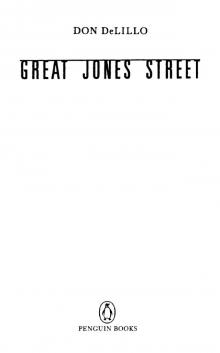 Great Jones Street (Contemporary American Fiction)
Great Jones Street (Contemporary American Fiction)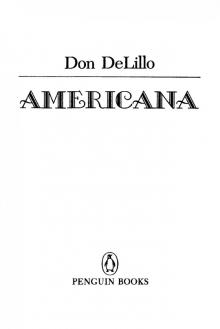 Americana
Americana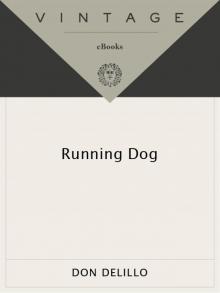 Running Dog
Running Dog Libra
Libra End Zone
End Zone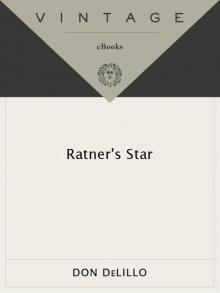 Ratner's Star
Ratner's Star Underworld
Underworld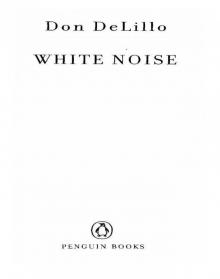 White Noise
White Noise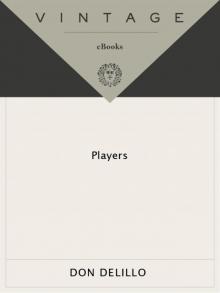 Players
Players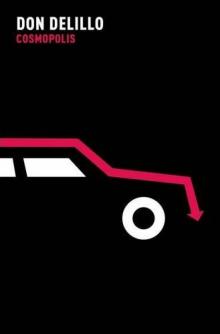 Cosmopolis
Cosmopolis The Silence
The Silence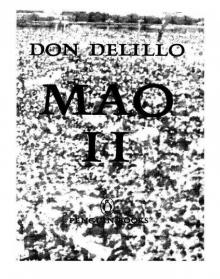 Mao II
Mao II Zero K
Zero K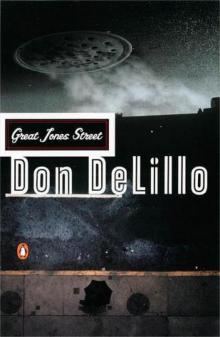 Great Jones Street
Great Jones Street The Angel Esmeralda
The Angel Esmeralda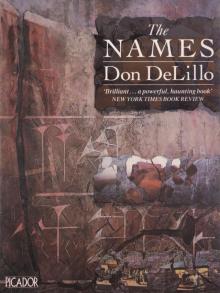 The Names
The Names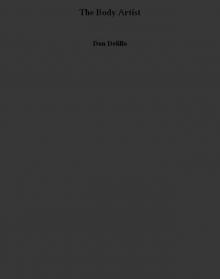 The Body Artist
The Body Artist Point Omega
Point Omega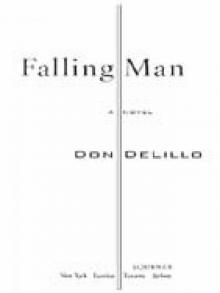 Falling Man
Falling Man